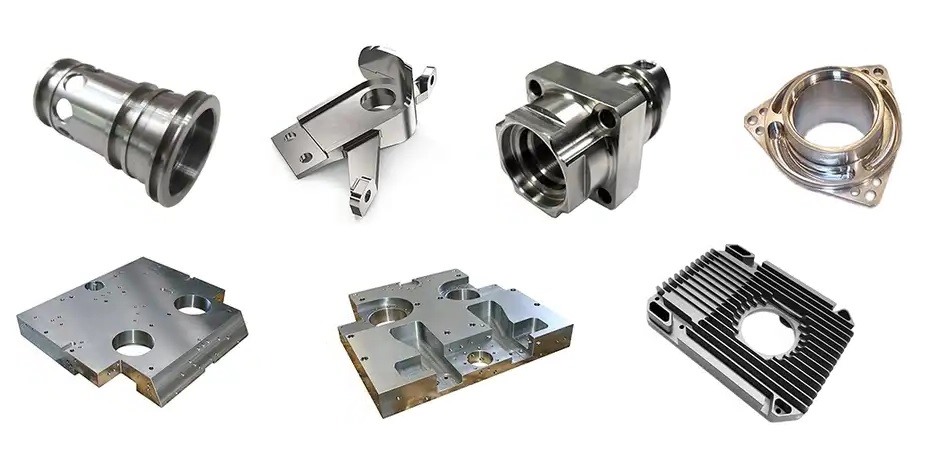Titanium vs Aluminum: A Comprehensive Comparison of Characteristics and Uses
 Jul 21,2023
Jul 21,2023

Nowadays, every industry is searching for new ways to boost its production and make a lot of profit at reduced cost. When it comes to selection of materials for different applications, they prefer light weight, cheaper and energy effective materials. So, the choice between titanium and aluminum often arises. Both titanium and aluminum offers a unique set of properties. They also offer distinct advantages depending on the specific requirements. So, a thorough knowledge about these metals is necessary, in order to make a wiser choice for a particular application.
In this article, we will discuss certain characteristics and uses of titanium and aluminum. Also, we compare them in terms of their composition, weight, density, strength, hardness, thermal conductivity, and machinability. After reading this article you will be able understand the key differences between these metals and be able to make informed decisions for your own projects.
Titanium Vs Aluminum Characteristics
Both titanium and aluminum share a number different and unique characteristics that separates them. Although both have some similarities like both are light weight and durable. So in order to make a choice between them for your project, you must know about the key differences between them. Some of them are discuss below
You can also check the details of titanium grade 1 in this article.

Titanium Vs Aluminum: Element Composition
Composition usually refers to the constituent elements which together make the material. The presence of these constituent elements affects the various properties like weight, corrosion resistance and other properties of a material to great extent.
In the elemental composition of titanium, titanium is basic constituent with other constituent’s elements having compositions between 0.013 and 0.5%. These constituents are usually hydrogen, nitrogen, oxygen, iron, carbon, and nickel. And in aluminum, the basic constituent is aluminum along with other constituents like silicon, zinc, magnesium, manganese, copper, iron, titanium, chromium, zirconium, and many more.
Is Titanium Lighter Than Aluminum?
Both titanium and aluminum are light weigh as compared with other metals. However there is difference between their weights. One of the titanium characteristic is that it is lighter in weight than aluminum. It has a density of 4.51 g/cm³ which is two-third of the density of aluminum which is of 2.70 g/cm³. So, in production lesser amount of titanium is required to achieve aluminum physical strength. Titanium exhibits a lower weight-to-volume ratio than aluminum. Due to its lightweight nature, titanium is always an ideal choice where weight reduction is required.
Strength
Strength is defined as the ability of material to resist any non-recoverable deformation. This ability is measured on the basis of application for which materials is used. A few of such fors of titanium vs. aluminum strengths’ are discussed below:
Tensile Strength
Different grades of titanium have distinctive value of tensile strength. At moderate temperature its softest grade’s ultimate tensile strength ranges from 230 MPa to 1400 MPa for high strength alloys. Also the proof strengths of titanium vary from around 170 MPa to 1100 MPa based on grade and condition.
Whereas, aluminum alloys have greater strength than pure aluminum. Tensile strength of pure aluminum is of 90 MPa. It can be enhance up to 690 MPa for some heat-treatable alloys of aluminum.
Shear Strength
It is the strength of a material to resist any change in its structure. This type of deformation usually occurs along the plane or parallel to plane. One of the Aluminum characteristic is that it has greater shear strength as compared with titanium. It has a value of shear strength ranging from 85 to about 435 MPa. And titanium has values in the range between 40 to 45 MPa.
Yield Strength
It is the maximum stress at which material begins to deform. Titanium has lower to moderate value of yield strength. Its value ranges between 170 MPa to 480 MPa. Due to this, they are not suitable for aircraft and engines application. Aluminum has yield strength of 7 MPa to 11 MPa. However, its alloy exhibits a high value of yield strength. Alumnium alloy values ranges between 200 MPa and 600 MPa.
Chinese Machining Services
Send drawings to info@tuofa-cncmachining.com
Faster and Cheaper
Hardness
The ability of material to prevent deformation, scratching, etching, or denting along its surface is known as hardness. When it comes to hardness, titanium wins over aluminum. It has hardness value of 70 HB. This value is measured using Brinell’s hardness machine. And pure aluminum has a value of 15 HB which is lower than the value of titanium. However, there are some alloys of aluminum which shows higher value of hardness as compared to titanium. These alloys include AA7075 temper T7 & T6, AA6082 temper T5 & T6, and more.
Melting point
Melting point is the temperature at which a material begins changes its phase from solid to liquid. This temperature plays vital role because when a material reaches this temperature then it is easy to form it into any desired shape. Usually titanium has high value of melting temperature as compared with aluminum. It has a melting point of 1650 – 1670 °C (3000 – 3040 °F). Due to this higher it is used as refractory. On the other hand, aluminum has lower melting point compared to titanium 660.37 °C (1220.7 °F).
Color
Color plays a vital role in differentiating any two metals. Titanium has silvery color. This appears dark when viewed under light. And, Aluminum has silvery-white appearance. This appearance of color ranges from silver to dull grey.
Does titanium conduct heat?
Yes titanium does conduct heat. But is low conductor of heat as compared with aluminum. This is because it has low value of thermal conductivity as compared to aluminum.
Thermal Conductivity
Thermal conductivity refers to the ability of a material to conduct heat. This ability of material is determined by the value of its thermal conductivity. A material which has value of thermal conductivity is radiator. And the material which has low value is referred to as insulator. In this aspect, aluminum outperforms titanium significantly. Aluminum has a high value of thermal conductivity of 1460 BTU-in/hr-ft²-°F (210 W/m-K). on the other hand titanium has low value of thermal conductivity i.e. 118 BTU-in/hr-ft²-°Fm (17.0 W/m-K).
Titanium vs aluminum characteristic
|
Characteristics |
Titanium |
Aluminum |
|
Composition |
Titanium with hydrogen, nitrogen, oxygen, iron, carbon, and nickel. |
Aluminum with silicon, zinc, magnesium, manganese, copper, iron, titanium, and many more.
|
|
Weight |
Heavier than Aluminum |
Lighter than Titanium |
|
Hardness Value |
70 HB |
15 HB |
|
Melting Point |
1650 – 1670 °C |
660.37 °C |
|
Color |
silvery color and appears dark when viewed under light |
silvery-white appearance ranges from dull to grey |
|
Thermal Conductivity |
Low thermal conductor |
High thermal conductor |
|
Cost |
Expensive |
More economical |
|
Machinability |
Difficult machining process |
Easy to machine |
Titanium Vs Aluminum Uses
Titanium vs Aluminum Camping Cookware
Camping cookware requires durability, lightness, and resistance to corrosion. Titanium is usually in this regard because it offers excellent strength-to-weight ratio, corrosion resistance, and is also has no reaction with food. Due to their low durability aluminum are less suitable for camping cookware.
Titanium vs Aluminum Bike Frame
The qualities that Bicycle frames must possess include higher strength, lightweight, and capable of absorbing shocks. Titanium bike frames are highly recommended. They provide higher strength, durability, and comfortable ride quality. Titanium frames also provide a good balance between strength and weight. These qualities make them ideal for both professional cyclists and enthusiasts. Although, lighter in weight, Aluminum frames are not offer same level of vibration dampening and longevity as titanium.
Titanium vs Aluminum Ridge Wallet
Wallets made from titanium and aluminum has gained popularity nowadays. This is due to their sleek design and durability. Ridge wallets made from titanium usually offers extraordinary strength, resistance to corrosion, and lightweight construction. On the other hand, Aluminum ridge wallets are also lighter in weight but lack the level of robustness as compared with titanium. The final decision is always made the basis of personal experience preferences and desired features.
Apple Watch Titanium vs Aluminum
The selection between titanium and aluminum material for an Apple Watch is done on the basis of personal experience and priorities. Titanium made models of Apple Watch offers enhanced durability and lightweight construction. They also give a premium aesthetic to the model. On the other hand, aluminum models are lighter and more affordable. It makes them suitable for those people with low budget.
Titanium vs aluminum Similarities
|
Property |
Aluminum/ Titanium |
|
Lightweight |
Aluminum weight and titanium weight are usually lower than many metals. |
|
Corrosion Resistance |
Both have good resistance to corrosion |
|
Durability |
Titanium and Aluminum are famous for their durability |
|
Aerospace Technology |
Both have extensive application in manufacturing of aerospace components |
Is Titanium Better Than Aluminum?
The answer of this question that whether titanium is better or aluminum depends upon the specific application and requirements under which these materials are used. Titanium is famous for its exceptional strength, resistance to corrosion, and lightweight properties. O the other hand, aluminum is an excellent thermal conductor and is more cost-effective. The selection between these should always been made on the desired characteristics and application.
However, people always compare them in terms of their strength to weight ratio. In this regard titanium is better than aluminum.
What Type of Metal is Aluminum?
Aluminum is a versatile non-ferrous metal having silvery tone with a considerable flexibility.It is most abundant element in earth’s crust. Aluminum has lightweight and exhibits remarkable corrosion resistance, low density, and high thermal and electrical conductivity. These qualities make it suitable to be used in many applications. In order to increase their mechanical properties, they are combined with other metal to make their alloys. The great advantage of aluminum is that they are more economical and are easy to machine.
Is Titanium a Heavy Metal?
No, Titanium is not a heavy metal. Titanium falls in the category of lightweight materials and has good strength and durability. It has strength equal to steel, but has a weight 45% less than that of steel. It is stronger than aluminum but has weight 60% more than aluminum. It is heavier when compared to aluminum.
Aerospace Titanium
Titanium and its alloys have extensive application in the aerospace field. This is because they have high strength to weight ratio and excellent corrosion resistance. It can maintain its strength even at 1,000 degrees Fahrenheit. But due to their expensive cost there usage is limited as compared to aluminum alloys. Aerospace titanium is used in the manufacture of aerospace components like airframe structural components and skin, aircraft hydraulic systems, air engine components, rockets, missiles, and spacecraft. Military also utilized titanium in their guided missiles and in artillery. Titanium is also used in submarines and ship’s propellers, shafts, rigging, and other highly corrosive parts.
Aerospace Aluminum
Due to their high resistance to corrosion and light weigh, aluminum alloys are preferred by many engineers in aircraft fuselages and other engineering structures and compounds. In aerospace, aluminum was first used by the wright brothers. Aluminum aerospace are also preferred due to their low cost as compared with other aerospace materials like and Mg-, Ni-, Co- and Ti-based alloys. Different grades of aluminum alloys are implied in the aerospace industry due to their specific properties. These Al alloys grade includes 7075, 6061, 6063, 2024 and 5052. Among these grades, the grade 7075 Al alloy is most used by the aircraft industry due to the presence of zinc in it which gives its strength comparable to steel.
Try Tuofa Now!
Send drawings to info@tuofa-cncmachining.com
China Tuofa Engineer Support Team
Real human quotes are more accurate than software quotes
How expensive is Titanium?
Titanium is generally more expensive than aluminum. This is due to their difficult extraction process and limited availability. Titanium is usually delicate to perform. Therefore, it requires skilled labor for its grinding, bending, and welding. Also titanium unique properties and scarcity is the another reason for higher price tag. However, the exact cost of titanium varies on many factors. These factors include grade, form, quantity, and current market conditions.
Aluminum vs Titanium Cost
When it comes to cost, aluminum is significantly cheaper than titanium. The process to manufacture and extract aluminum is quite easier, less expensive and widely available. On the other hand, the manufacturing and extraction process titanium is difficult and requires skilled labor making it a more expensive as compared with aluminum. Also titanium unique properties and scarcity is the another reason for higher price tag. So when budget is a concerned, one should go for aluminum.
Titanium vs Aluminum Machinability
Machinability is a term refers to how easily a material can be machined or shaped using various tools and techniques. Interestingly, with the usage CNC turning and milling, it becomes easier to machine aluminum and titanium in less than a day. Aluminum is known for its excellent machinability. This is because it is softer in nature and more malleable as compared to titanium. While due to its hard nature Titanium is more challenging to machine. However it can still be machined using tools and techniques with accuracy. The machining waste is also considered while selecting material for machining. Due to their low cost, aluminum is usually used to create prototype which are then switch to titanium for parts production.
Choose Aluminum Or Titanium Custom Parts?
In conclusion, titanium and aluminum are two famous lightweight materials having various advantages and characteristics. Titanium has unique strength, resistance to corrosion, and thermal stability whereas aluminum is famous for its lower cost, higher value of thermal conductivity and easier machining process. Aluminum is more economical than titanium. Both found great application in various industries. However, usually titanium uses are preferred where higher strength to weight ratio is required and aluminum is preferred where low budget and higher thermal conductivity is required.
When it comes to manufacturing and machining of any material, Toufa is well known for its production. Tuofa has wide ranges of method through which titanium and aluminum are manufactured like CNC machining, 3D manufacturing process etc. We have experts who will assist you regarding your project and will also create prototypes for you. We assure you that we will do your work with 100% accuracy and reliability.
Just contact us, and let’s work together.
FAQs
7068 Aluminum vs Titanium
Both 7068 aluminum and titanium are well known for its high-strength. Titanium has higher strength-to-weight ratio. It also has good resistance to corrosion. 7068 aluminum has exceptional toughness and high tensile strength.
7075 Aluminum vs Titanium
Titanium is famous for its exceptional strength and corrosion resistance. And 7075 aluminum is famous for its fatigue strength and machinability. Consider the specific needs of your project to determine which material best suits your requirements.
 Tel/WeChat:
Tel/WeChat:  Email:
Email: 
 Home
Home


 Powder Coating Aluminum: The Complete Guide
Powder Coating Aluminum: The Complete Guide 







